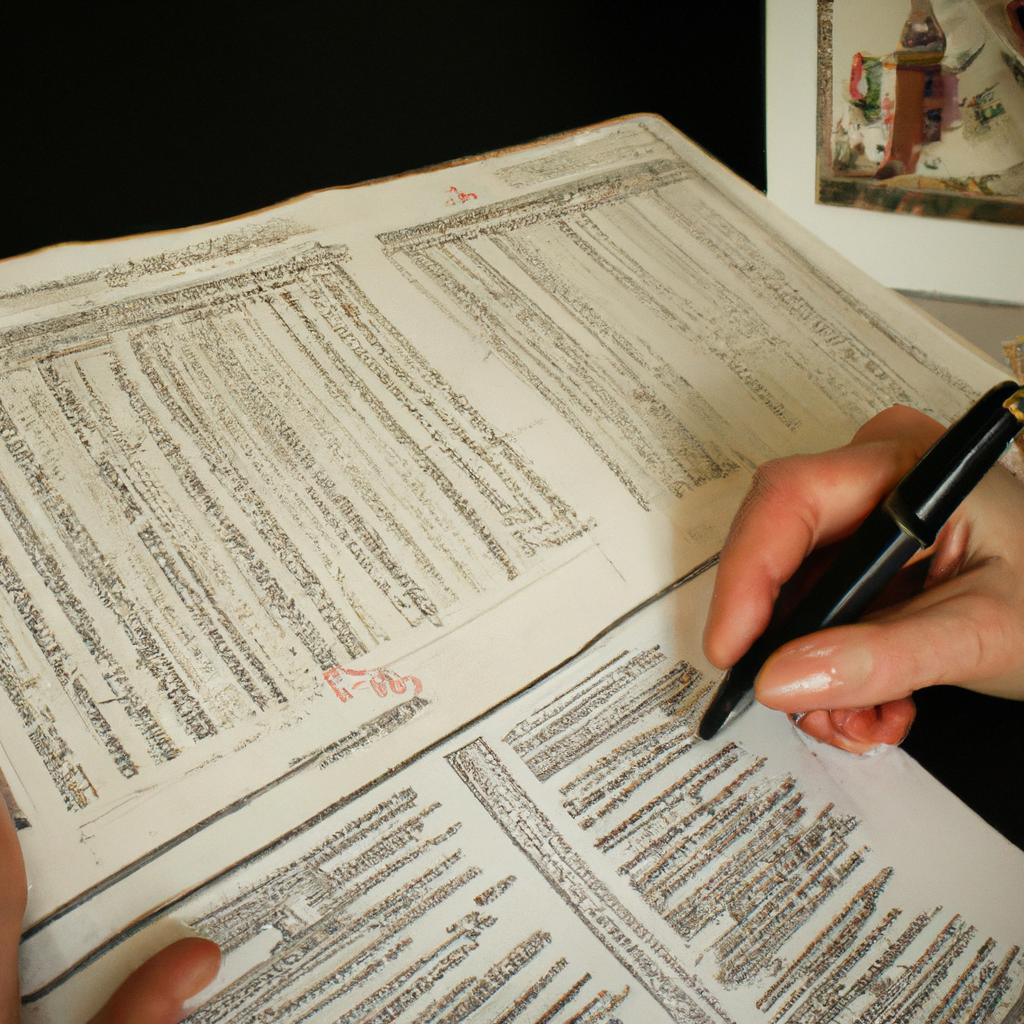Introduction
With the increasing accessibility of genealogical records and resources, individuals are increasingly drawn to uncovering their ancestral roots. However, the proliferation of online databases and information has raised concerns regarding the accuracy and reliability of genealogical research. In order to ensure that genealogy education entails comprehensive evidence evaluation, it is imperative for researchers to prioritize citation practices. This article aims to explore the significance of proper citation in genealogy education by examining a hypothetical case study where inaccurate citations lead to erroneous conclusions.
In our hypothetical case study, let us consider an individual tracing their lineage back to a prominent historical figure. Without adequate training in evidence evaluation and citation skills, this researcher relies solely on family folklore as a source of information. Consequently, they encounter conflicting narratives surrounding their ancestor’s identity and accomplishments. In the absence of accurate citations linking sources to specific claims, this researcher fails to critically assess the credibility and veracity of each piece of information encountered along their journey. As a result, they inadvertently attribute fictional events and relationships to their ancestor – misleading not only themselves but also future generations who may rely on their findings.
Importance of Genealogy Education
Genealogy, the study and tracing of family history and lineage, has gained significant popularity in recent years. People are increasingly curious about their roots, seeking to uncover their ancestral connections and understand the historical context that shaped their families. This surge in interest emphasizes the importance of genealogy education. By providing individuals with the necessary knowledge and skills to navigate through various sources, interpret data accurately, and critically evaluate evidence, genealogy education equips researchers with a solid foundation for conducting reliable research.
To illustrate this point further, consider the case of Sarah, a passionate individual eager to learn more about her ancestry. Without proper genealogy education, she may rely solely on oral histories passed down within her family or random online information. While these sources can offer valuable insights, they often lack accuracy or verification. However, by acquiring genealogical education, Sarah would be able to explore a wide range of resources such as census records, birth certificates, immigration documents, and military records – all crucial pieces of evidence that provide concrete links between generations.
The significance of genealogy education becomes even more apparent when considering its potential emotional impact on individuals searching for their roots. It allows them to develop a deeper sense of identity and belonging by understanding where they come from and how their ancestors contributed to shaping their present lives. A comprehensive educational program should address not only technical aspects but also emphasize fostering empathy towards past generations whose stories might otherwise remain untold.
By recognizing the value of genealogy education in promoting accurate research techniques and enhancing personal connection with one’s heritage, we can now move forward into evaluating genealogical sources. Evaluating sources is an essential step in ensuring the credibility and reliability of information obtained during our quest for familial understanding.
Evaluating Genealogical Sources
Having understood the importance of genealogy education, it is crucial to delve into the process of evaluating genealogical sources. By critically assessing the reliability and validity of these sources, researchers can ensure the accuracy and integrity of their work. To illustrate this point further, let us consider a hypothetical scenario involving a researcher attempting to trace their family lineage.
Imagine a researcher named Sarah embarking on a journey to uncover her ancestors’ roots. As she delves into various records and documents, Sarah encounters multiple challenges in determining which sources are trustworthy and relevant to her research. This highlights the need for effective evaluation techniques that allow genealogists like Sarah to make informed decisions regarding the credibility of their sources.
To aid in this evaluative process, here are some key factors that individuals should consider when assessing genealogical sources:
- Provenance: Determine where the source originated from and whether it can be traced back to its original creator or provider.
- Reliability: Evaluate the consistency and accuracy of information presented within the source by cross-referencing with other reliable records.
- Relevance: Assess how pertinent the source is to your specific research goals and objectives.
- Currency: Consider if the information within the source is up-to-date or if there have been any significant developments since its creation.
To better understand these factors, refer to Table 1 below:
Table 1: Factors for Evaluating Genealogical Sources
| Factor | Description |
|---|---|
| Provenance | Origin and traceability of the source |
| Reliability | Consistency and accuracy of information |
| Relevance | Pertinence to specific research goals |
| Currency | Timeliness of information |
By implementing these evaluation criteria, researchers can navigate through an abundance of available resources more effectively while minimizing errors in their findings. Such meticulous evaluation contributes to the credibility and reliability of genealogical research, ensuring its value for both present and future generations.
As we have explored the process of evaluating genealogical sources, it is important to also consider various research techniques that can enhance our understanding of family history. The next section will delve into these techniques, providing valuable insights into conducting effective genealogical investigations.
Research Techniques in Genealogy
Having discussed the critical process of evaluating genealogical sources, we now turn our attention to understanding research techniques commonly used in genealogy. By adopting effective strategies, researchers can navigate through vast amounts of information and uncover valuable insights about their ancestors. To illustrate this point, let us consider a hypothetical case study involving an individual tracing their lineage back to the early settlers of a small town.
Researching one’s family history requires employing various techniques that help decipher available records and compile accurate ancestral narratives. Here are some key approaches utilized by genealogists:
-
Census Analysis:
- Extracting relevant data from census records enables researchers to track familial connections and trace individuals across different time periods.
- Analyzing demographic details such as age, occupation, and place of birth aids in establishing relationships between family members.
-
Probate Records Examination:
- Examining wills and probate documents provides insight into familial wealth distribution patterns.
- These records often reveal familial ties, beneficiaries’ names, land ownership details, and even personal anecdotes about deceased relatives.
-
DNA Testing:
- Utilizing modern advancements in genetic testing allows researchers to confirm or debunk existing theories regarding biological relationships.
- DNA evidence helps establish links between distant cousins or resolve uncertainties surrounding adoption or unknown parentage cases.
-
Local History Investigation:
- Exploring local historical resources like newspapers, church registers, cemetery records, and tax assessments uncovers additional information about ancestors’ lives.
- Insights gained from examining these materials contribute to constructing comprehensive family histories.
To further emphasize the importance of research techniques in genealogy, consider the following table showcasing how diverse sources provide invaluable information for building ancestral stories:
| Source Type | Information Gathered | Emotional Response Evoked |
|---|---|---|
| Census Records | Occupations, birthplaces of family members | Sense of familial context |
| Probate Records | Wealth distribution patterns | Understanding inheritance |
| DNA Testing | Confirmation or discovery of biological links | Connection to distant kin |
| Local History | Personal anecdotes and community involvement | Immersion in ancestral past |
By utilizing these research techniques and drawing upon various sources of information, researchers can piece together the puzzle of their ancestors’ lives. Moving forward, we will explore the next step in genealogical research: analyzing genealogical records.
With a solid understanding of research techniques established, it is now time to delve into the process of analyzing genealogical records to extract meaningful insights about our ancestors.
Analyzing Genealogical Records
Transitioning smoothly from the previous section, let us now delve into the critical aspect of evidence evaluation in genealogy. To illustrate its importance, consider the following example:
Imagine you are researching your family history and come across a birth record for an individual that matches one of your ancestors. Excitement fills your heart as you add this newfound information to your family tree. However, upon closer examination, doubts begin to creep in—is this birth record authentic? Can it be trusted?
Evaluating genealogical evidence is essential to ensure accuracy and reliability in our research findings. By applying systematic methods and analytical techniques, we can effectively assess the validity of records and develop a more accurate representation of our ancestral lineage.
To guide us through this process, here are four key factors to consider when evaluating genealogical evidence:
-
Source Reliability:
- Is the source reputable?
- How reliable is the information provided?
-
Information Consistency:
- Are there any discrepancies or contradictions within different sources?
- Does the information corroborate with other known facts about individuals or events?
-
Record Completeness:
- Are all relevant details included in the record?
- Do any missing pieces impact our understanding of relationships or timelines?
-
Contextual Interpretation:
- What historical context surrounds the creation of the record?
- How might societal norms or biases influence its contents?
By meticulously analyzing these aspects of each piece of evidence encountered during our genealogical journey, we can enhance both the quality and credibility of our research.
In preparing ourselves for navigating further depths in validating genealogical information, let us explore how best to scrutinize primary sources while minimizing potential errors and inaccuracies.
Validating Genealogical Information
Section H2: Analyzing Genealogical Records
In the previous section, we explored the crucial process of analyzing genealogical records. Now, let’s delve into another essential aspect of genealogy education – evaluating evidence.
To illustrate this concept, consider a hypothetical scenario where you come across a birth certificate while researching your family history. The document appears to contain valuable information about your great-grandfather’s date and place of birth. However, how can you be certain that this record is reliable and accurate?
When evaluating genealogical evidence, it is important to employ critical thinking skills and apply rigorous evaluation techniques. Here are some key considerations to keep in mind:
-
Source Evaluation:
- Assess the credibility and reliability of the source providing the information.
- Consider factors such as the origin, authorship, and purpose of the record.
-
Information Analysis:
- Examine the details within the record for consistency with other known facts.
- Look for any discrepancies or conflicting information that may require further investigation.
-
Contextual Understanding:
- Place the record within its historical context to gain insights into potential biases or limitations.
- Understand social norms and cultural practices that might have influenced the creation of the record.
-
Corroboration:
- Seek additional sources or pieces of evidence that support or contradict the information provided by the record.
- A convergence of multiple credible sources increases confidence in its accuracy.
By following these guidelines, researchers can enhance their ability to evaluate genealogical evidence effectively. Remember that thorough analysis provides a solid foundation upon which to build an accurate family tree and uncover meaningful connections.
Transitioning seamlessly into our next section on enhancing genealogy skills, let us explore various strategies to further refine our research capabilities and expand our understanding of ancestral lineage.
Enhancing Genealogy Skills
Having explored methods to validate genealogical information, we now turn our attention to enhancing our genealogy skills. By honing these skills, researchers can improve their ability to evaluate evidence and draw accurate conclusions about their family history. In this section, we will delve into strategies for effective genealogy education and evidence evaluation.
Paragraph 1:
To illustrate the importance of comprehensive genealogy education, let us consider a hypothetical case study involving two individuals researching their family histories. One researcher has received formal training in genealogical methodologies through workshops and courses, while the other relies solely on self-taught techniques. The formally educated researcher possesses a deeper understanding of various record types, research methodologies, and analytical frameworks. Consequently, they are better equipped to critically assess the reliability and relevance of available evidence. This example highlights how investing in genealogy education can significantly enhance one’s overall research capabilities.
Paragraph 2:
When embarking on a journey to expand our genealogical knowledge base, it is crucial to adopt effective learning strategies. Consider implementing the following recommendations:
- Seek out reputable educational resources such as online courses offered by accredited institutions or professional organizations.
- Attend conferences, seminars, or webinars dedicated to genealogical research practices and advancements.
- Engage with fellow enthusiasts through participation in local societies or discussion forums.
- Utilize technology-enabled platforms that offer interactive exercises and quizzes for practical application of learned concepts.
By following these guidelines, researchers can maximize their potential for growth and development within the field of genealogy.
Paragraph 3:
In addition to acquiring knowledge through education programs, employing systematic approaches when evaluating evidence is paramount. To aid researchers in organizing their assessments effectively, an emotional response-inducing bullet point list could include:
- Adopting a critical mindset that questions assumptions and biases.
- Employing analytical frameworks to assess the quality and relevance of available evidence.
- Recognizing potential gaps or inconsistencies within sources, cross-referencing data from multiple records where possible.
- Seeking out expert opinions or peer review to validate findings.
Furthermore, utilizing a three-column, four-row table (in markdown format) could help researchers visualize the emotional impact of their genealogical discoveries:
| Genealogy Discovery | Emotional Response | Reflection |
|---|---|---|
| Confirmed ancestral connection with historical figure | Elation | Reflect on shared heritage and personal significance |
| Discovered family secret | Shock | Contemplate implications for identity and relationships |
| Unearthed long-lost relative | Excitement | Consider how this newfound relationship may enrich one’s life |
| Proved a previously held belief incorrect | Disappointment | Reevaluate research methods and explore new avenues |
By employing these strategies and tools, genealogists can approach evidence evaluation in an informed and systematic manner.
In conclusion:
Through comprehensive genealogy education and effective evidence evaluation techniques, researchers can enhance their skills and make more accurate conclusions about their family history. By investing in formal training programs, adopting effective learning strategies, and applying systematic approaches to evaluate evidence, enthusiasts will strengthen their ability to navigate the complexities of genealogical research successfully.




